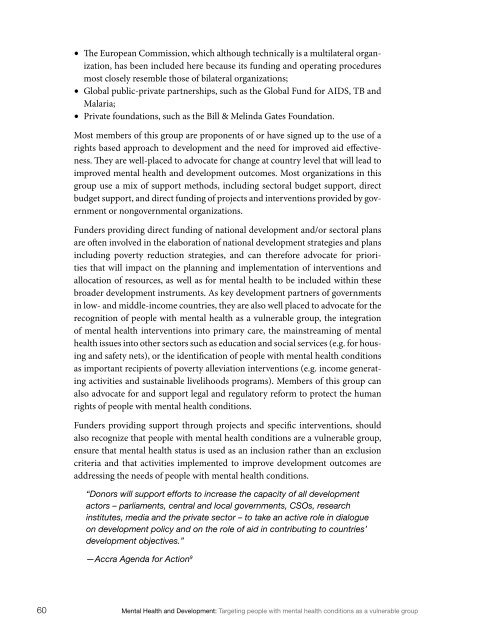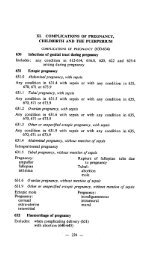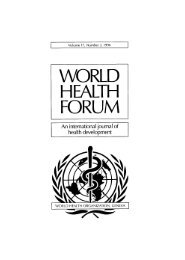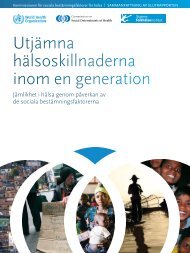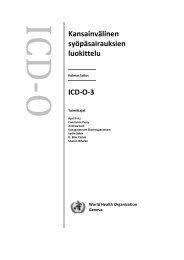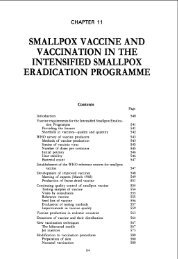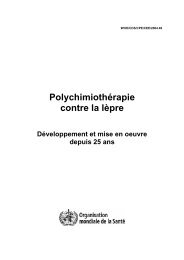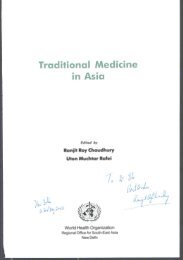MENTAL HEALTH AND DEVELOPMENT: - libdoc.who.int - World ...
MENTAL HEALTH AND DEVELOPMENT: - libdoc.who.int - World ...
MENTAL HEALTH AND DEVELOPMENT: - libdoc.who.int - World ...
Create successful ePaper yourself
Turn your PDF publications into a flip-book with our unique Google optimized e-Paper software.
• The European Commission, which although technically is a multilateral organization,<br />
has been included here because its funding and operating procedures<br />
most closely resemble those of bilateral organizations;<br />
• Global public-private partnerships, such as the Global Fund for AIDS, TB and<br />
Malaria;<br />
• Private foundations, such as the Bill & Melinda Gates Foundation.<br />
Most members of this group are proponents of or have signed up to the use of a<br />
rights based approach to development and the need for improved aid effectiveness.<br />
They are well-placed to advocate for change at country level that will lead to<br />
improved mental health and development outcomes. Most organizations in this<br />
group use a mix of support methods, including sectoral budget support, direct<br />
budget support, and direct funding of projects and <strong>int</strong>erventions provided by government<br />
or nongovernmental organizations.<br />
Funders providing direct funding of national development and/or sectoral plans<br />
are often involved in the elaboration of national development strategies and plans<br />
including poverty reduction strategies, and can therefore advocate for priorities<br />
that will impact on the planning and implementation of <strong>int</strong>erventions and<br />
allocation of resources, as well as for mental health to be included within these<br />
broader development instruments. As key development partners of governments<br />
in low- and middle-income countries, they are also well placed to advocate for the<br />
recognition of people with mental health as a vulnerable group, the <strong>int</strong>egration<br />
of mental health <strong>int</strong>erventions <strong>int</strong>o primary care, the mainstreaming of mental<br />
health issues <strong>int</strong>o other sectors such as education and social services (e.g. for housing<br />
and safety nets), or the identification of people with mental health conditions<br />
as important recipients of poverty alleviation <strong>int</strong>erventions (e.g. income generating<br />
activities and sustainable livelihoods programs). Members of this group can<br />
also advocate for and support legal and regulatory reform to protect the human<br />
rights of people with mental health conditions.<br />
Funders providing support through projects and specific <strong>int</strong>erventions, should<br />
also recognize that people with mental health conditions are a vulnerable group,<br />
ensure that mental health status is used as an inclusion rather than an exclusion<br />
criteria and that activities implemented to improve development outcomes are<br />
addressing the needs of people with mental health conditions.<br />
“Donors will support efforts to increase the capacity of all development<br />
actors – parliaments, central and local governments, CSOs, research<br />
institutes, media and the private sector – to take an active role in dialogue<br />
on development policy and on the role of aid in contributing to countries’<br />
development objectives.”<br />
—Accra Agenda for Action 9<br />
60 MentalHealthandDevelopment:Targetingpeoplewithmentalhealthconditionsasavulnerablegroup


